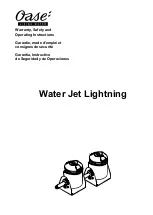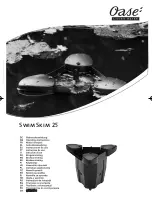
214 Troubleshooting guide
Manual Power Quality Filter PQFM
Fault message
Cause
What to do
IGBT
permanent
The IGBT module reports an
error that cannot be cleared
by the system. This error can
be due to peak overcurrent,
too low control voltage for the
IGBT drivers or IGBT module
failure.
−
Identify unit for which the red LED (3) is
on.
−
Inspect the corresponding IGBT module
(bridge and DC capacitors) for visual
traces of damage. If they are present,
exchange the IGBT module.
−
Verify flat cable connection between the
Control board and the IGBTs.
−
Ensure that the Control board power
supply is around 24 V. If significantly
lower, check the 24 V power supply and
the wiring between this supply and the
control board.
IGBT
temporary
The IGBT modules report a
transient error that could be
automatically cleared by the
system. This error can be due
to peak overcurrent or a too
low control voltage for the
IGBT drivers.
If the errors occur sporadically and the
system rides through, nothing has to be
done. If the system does not ride through
(too many transient errors in a short
time):
−
Verify that the filter CTs are properly
installed and are not shorted.
−
Verify that the unit current ratings and
order programmed at the
commissioning stage corresponds to
the rating and order physically present.
−
Verify the filter cooling system and
check the IGBT-temperature using the
PQF-Manager.
−
Deactivate harmonic and reactive
power requirements and see if the
problem persists.
−
Inspect the items discussed for the
‘IGBT permanent’ message.
Loss of phase
The system has detected a
loss of supply on at least one
phase.
−
Measure the three line voltages and
check if they are within limits.
−
Measure the line voltages (e.g.
voltmeter) and compare them with the
line voltages given by the filter (PQF-
Manager or PQ-Link).
−
Check the AC voltage measurement
connectors (P6-1 to and P6-4) for loose
connections and component damage.
−
Check the connections between the
auxiliary fuses and the AC voltage
measurement connectors (P6-1 to and
P6-4).
−
Check the filter parameters
(Cf.
Chapter 8
).
















































